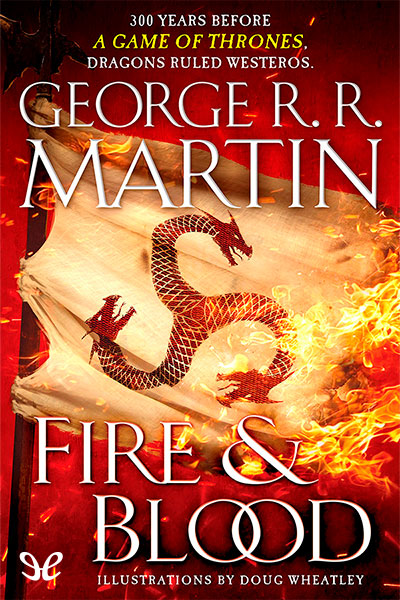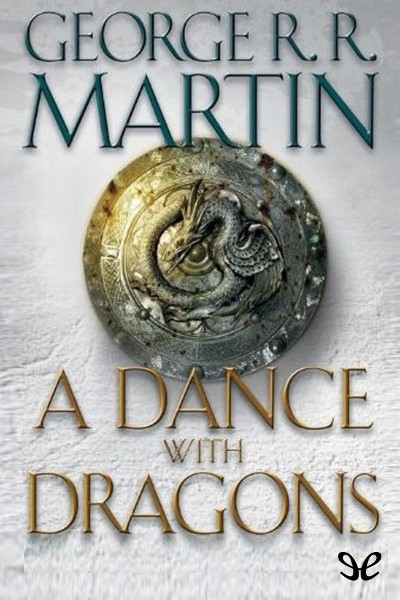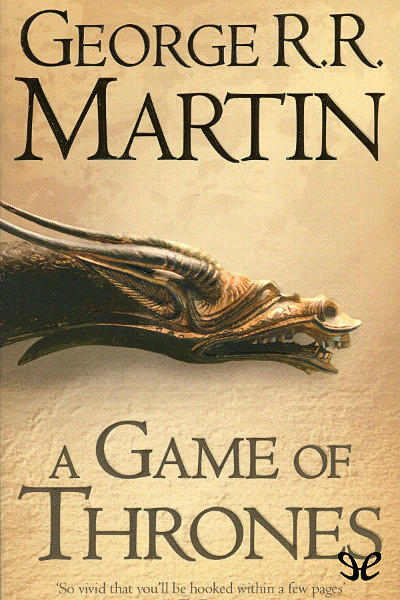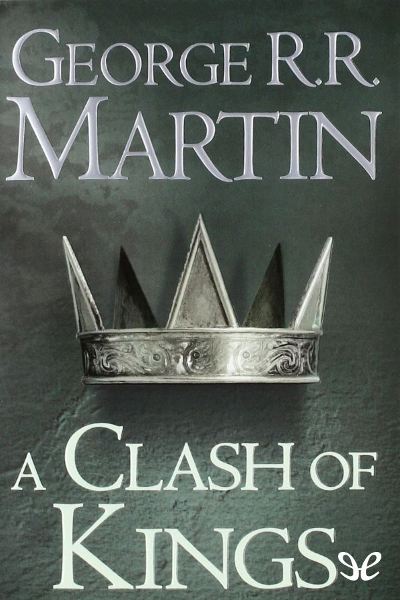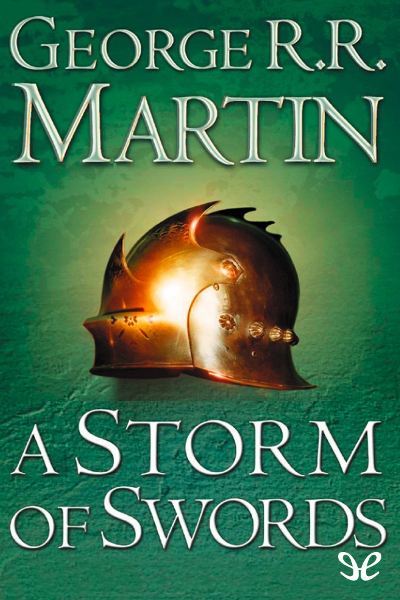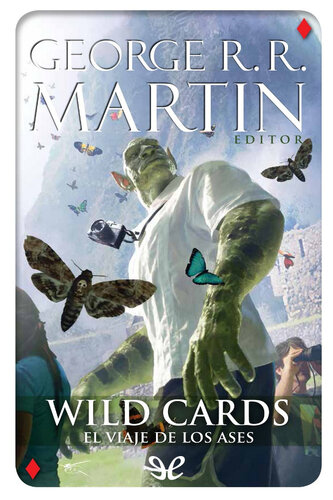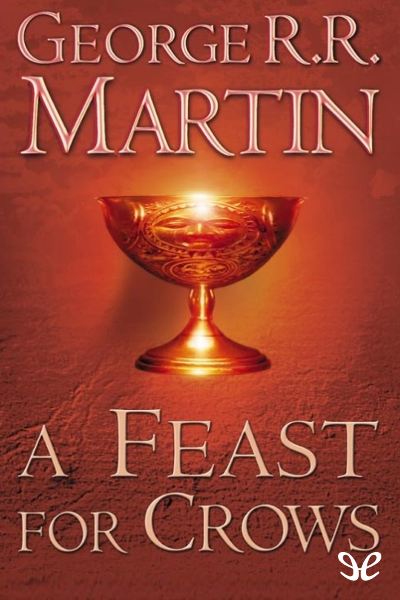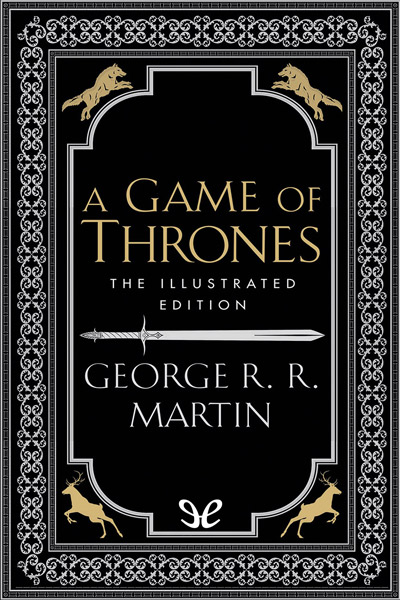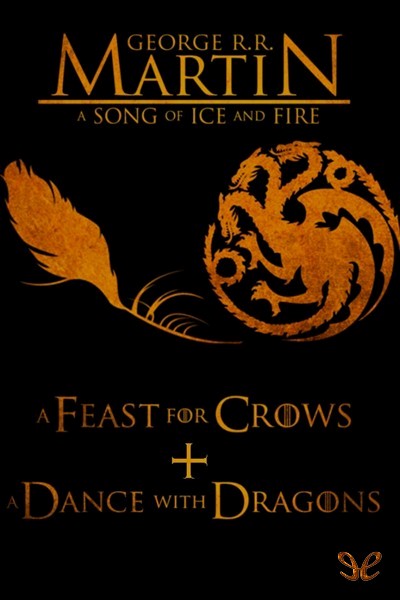oleebook.com
Festí de corbs de George R. R. Martin
de George R. R. Martin - Género: Aventuras
Sinopsis
Assedegats de sang, intrigants i assassins, els Lannister tenen el poder del Tron de Ferro en nom del rei nen Tommen. La guerra als Set Regnes s'ha extingit, però en els amargs dies de postguerra es desencadenen nous conflictes. Els Martell de Dorne i els Stark d'Hivèrnia busquen venjança pels seus morts. L'Euron Ull de Corb, el pirata més negre que ha desplegat mai una vela, torna de les runes fumejants de Valyria per reclamar les illes de Ferro. Des del gèlid nord, on els Altres posen en perill el Mur, l'aprenent de mestre Samwell Tarly porta un misteriós nadó a la Ciutadella. Amb un rerefons d'incest i fratricidi, alquímia i assassinat, la victòria serà per als homes i les dones que posseeixin l'acer més fred i el cor més fred. Amb Festí de corbs, Martin ens porta aquest tan esperat quart volum de la sèrie que ja és tota una fita entre els llibres de fantasia i que destaca com una gran obra mestra moderna.
Descargar
Descargar Festí de corbs ePub GratisLibros Recomendados - Relacionados
Reseñas Varias sobre este libro
The context here is everything.
A Song of Ice and Fire began with the publication of A Game of Thrones in 1996. Thrones introduced us to the land of Westeros, a continent the size of South America but suspiciously similar to medieval England. We followed a handful of characters representing various factions of the Seven Kingdoms, squabbling for the right to sit upon the Iron Throne. Its grittiness, tactility, fully-realized characters, and high stakes (a major character loses a head) gave it a cult following.
Two years after Thrones, A Clash of Kings was published. It told the story of the War of the Five Kings. Though it started slowly, it built to a fine ending, which included the shocking loss of Winterfell (home to many of our main characters) and the epic Battle of the Blackwater. A phenomenon had started.
clockwork, the third novel in the cycle, A Storm of Swords came two years after Kings. It was the biggest book so far, and easily the best. It featured all the hallmarks wed come to expect from author George R.R. Martin swordfights, detailed descriptions of food, casual misogyny, laughably crude sex scenes, shocking twists, major character deaths, and a humdinger of a cliffhanger but those elements were heightened. There are set pieces in Swords that are simply classic (see, e.g., the Red Wedding).
At the end of Swords, the fate of several major characters beloved characters dangled in the wind. Readers thirsted for the next installment. They began their wait.
And then crickets.
Nothing for five years.
After five years, we were given the present installment: A Feast for Crows. By this time, it was nearly impossible for any book to live up to the expectations of Swords. On this level, at least, Crows did not disappoint. It certainly met the expectation that it could not meet expectations.
As the old saying goes, the only thing worse than a bad meal is a small bad meal.
Not only did Crows fail to meet the challenge of Swords, it was over too quickly. When readers got to the last page, they were left to wonder, this is it?. Martin, you see, had allowed the manuscript for Crows to get so long, he decided to cut the thing in half. As he explained in a now-infamous postscript, Martin decided to split the book geographically, rather than chronologically. That meant that many of the best characters did not appear; none of the cliffhangers from Swords were resolved; and we were left to follow the dubious quests of various secondary personages. To make matters worse, Martin tentatively promised the next volume, A Dance With Dragons, would be published the next year.
That postscript was written in 2005.
Six years later, A Dance With Dragons was finally released.
Thus, it is a fortuitous time to review Crows. It is a much-maligned book, buffeted by two competing elements: the long wait before the book was published, and the longer wait after. In other words, the book has suffered critically because it took so long to come out and did not satisfy the pent-up demand. It also suffered because it did nothing to alleviate the long wait for Dragons.
Almost all agree that Crows is the weakest volume in A Song of Ice and Fire. Beyond that, opinions are split. Some people hate it with the light of a thousand suns. Some people love it a pug dressed in a tuxedo. Others acknowledge its weakness while admitting that a subpar steak is still a steak.
The length of time it takes Martin to churn out his opuses creates some high passion amongst his fans. That passion, combined with the internet and thousands of basements belonging to thousands of moms has created a great deal of hyperbolic ire directed towards Martin. While this criticism is a minority report, it is loud, and has colored the merits of Crows.
I am immune to this misplaced anger. I am a latecomer to Martins work; accordingly, when I started reading Thrones, four books had already been published, with a confirmed release date for the fifth. Ive never suffered the long withdrawals between books that the early adopters have had to overcome.
Due to this tardiness, I feel I can judge Crows based on its literary qualities, rather than its late arrival onto the Ice and Fire firmament. Unfortunately, the literary qualities of Crows are in short supply.
Most of Crows problems stem from Martins decision to divide the story by geography, and focus mainly on the action in Westeros that takes place south of the Wall. That means that the dwarf, Tyrion Lannister, Martins greatest creation, is missing. So are Jon Snow and Daenerys Targaryen. Not only are you losing fantastic, multidimensional characters with whom weve traveled for hundreds and thousands of pages, you lose the heart of the story. As far as I can tell (and Im sure Ill be wrong), Martins endgame seems to point towards two events: the struggle at the Wall against the onslaught of the walking dead (the song of Ice); and Daenerys struggle to reclaim the Iron Throne with the help of her dragons (the song of Fire). Neither of those crucial points get any play in Crows. Instead, its 700 pages of B-side.
The viewpoint characters in Crows (Martins story is told in the third-person limited, with chapters that alternate points-of-view among various characters) are mostly new to the spotlight. Jaime Lannister, Samwell Tarly, Arya Stark and Sansa Stark are the only returning viewpoint characters. The other viewpoints go to Queen Cersei, Aeron, Asha, and Victarion Greyjoy, Areo Hotah, Brienne of Tarth, Aerys Oakheart, and Arianne Martell.
Some of these characters are brand new. Some have been barely mentioned. Most of them are confusingly named (it gets a bit tough keeping Arya, Areo, Aeron, Aerys and Arianne apart, at least for me; unfortunately, Im not able to devote my entire life to these books). With some exceptions, their stories do not rise to the level of interest or intensity as the plotlines of Martins earlier books.
The bulk of this book, nearly a quarter of the pages, belongs to Cersei. Given space to develop her character, Martin is his usual strong self. Earlier in the series, Cersei was a terrifying, enigmatic peripheral character. In Thrones, she showed her smarts, and her cruelty, by getting the drop on Eddard Stark (admittedly not the sharpest tool in the shed). After the death of her son, King Joffrey, in Swords, Cerseis transformation began. She became more guarded, paranoid, and megalomaniacal. Her descent into madness is marked by her growing certainty that all her decisions are correct. The most interesting aspect of Crows is Cerseis long fall contrasted with the rise of a fanatical religious movement called the Faith.
Cersei is also beneficiary of one of Martin's weird peripheral-characters, the the fallen maester Lord Qyburn. Dr. Frankenstein, Qyburn toils away in the dungeons, doing odd experiments on living subjects, the result of which, it is obvious to see, will be half-human, half-monster. (Unfortuntately, Cersei's chapters are disadvantaged by a subplot concerning Westeros' outstanding loans to the Bank of Braavos. All the talk of high finance and trade federations harkened uncomfortably to another famous fantasy/sci-fi epic that lost its way).
Cerseis brother/lover, Jaime, has the second most page-time. His evolution from villain to hero takes a big leap forward, as we see him go from murderous sister-humper to a canny leader pushing back against the excesses of Kings Landing. With Jaimes chapters, Martin is able to tie up a few loose ends still dangling after the War of the Five Kings (for example, the dragging siege at Riverrun is finally concluded).
The balance of Crows is told in scattershot style through the ten remaining viewpoint characters.
We barely hear from Sansa, which is fine with me. Still, it is nice to see that she is developing at least a semblance of wit. I have a major problem with her character, mainly because Martin portrays Sansa as a real child; that is, as someone who is uninteresting and dumb. The problem with kids as characters is that kids are inherently boring. Kids arent clever, no matter what I see posted on Facebook. Only in a book or movie is a kid who cant tie his shoes crafty enough to turn his house into a living version of Mousetrap to foil a pair of robbers. So far, Sansa is realistic in the sense that she is dull, frightened, mistake-prone, and hollow. This also means she is a weak protagonist. In Crows, despite a limited appearance, she finally starts to learn some of the finer points of deception.
Arya Stark is a more traditional fictional child. Despite her tender years, she performs great heroic feats. Her ever-growing darkness, however, makes her a joy to follow (I wouldnt be surprised if, at the end of A Song of Ice and Fire, we counted her among the bad guys). In Crows, Arya is exiled to Braavos. She doesnt do much of anything, and her chapters seem meant only to explore the islands of Braavos. This wouldve been fine if Braavos was interesting. Instead, its just Venice, right down to the swaggering, arrogant, hand-talking men-folk.
Three characters, Areo, Arienne and Aerys, serve to give us entrée into Dorne. The set up here the machinations of Dorne against Kings Landing is obviously important. However, these chapters are rushed (and the Aerys chapters are so short and abrupt I have a hard time understanding their inclusion). The same goes for the chapters with the three Ironborn characters: Aeron, Asha, and Victarion. In perfunctory style, they are moved chess pieces, put in place for further development down the road.
The chapters following Brienne are walking on a treadmill. Shes given a lot of space to do things, but she never gets anywhere. Martin has her crisscrossing the ruins of a war-torn Westeros, searching for Sansa Stark. Of course, we know exactly where Sansa is; therefore, we know that Brienne is never going to find her. Also, for all her abilities, she is portrayed as a slow-thinker, a female Forrest Gump whos handy with a sword. Even if we didn't know where Sansa was hiding, wed have a pretty good idea that Briennes plan to find her would fail (it literally consists of her wandering around, asking where Sansa has gone).
These are structural problems. And forgivable, as long as the books quality had been consistent. Its not. This is a poorly written book by Martins standards. His descriptions seem tired. His writers tics are more pronounced. The dialogue, which had been whip-smart and eminently quotable, is execrable. It is flat, repetitive (Jaimes I love you too, sweet sister is repeated on a loop), and filled with odd, obtrusive, never-before-used idioms. For some reason, the characters start referring to their uncles as nuncles, even though uncle had served just fine before. In one chapter, the insult stoatish is used two or three times (as far as I can tell, it means weasel-) and then dropped a bag of flaming poo.
Despite taking five years to write, Crows feels a first draft. There are brief glimmers displaying Martins mastery of both his world and his writing. For instance, even though Briennes dead-end quest is inert as a narrative, Martins evocation of a war-weary Westeros is captivating, with its fresh graves, burnt-out homes, and outlaw-infested roads.
Subpar writing can be saved by a propulsive plot or a great set piece. As I noted before, the plot grinds forward. Moreover, nothing exciting happens. Swordplay is kept to a minimum. There isnt a battle to be found (in a way, Martins exhausted effort mirrors the tiredness of war-blasted Westeros). With the exception of Moby Dick, I try not to use the word boring in my . Here, though, things get awfully close to the b-word.
To be sure, there are a few saving graces. The first is the sex scenes. They are just awful, and bound to put a smile on your face. The high/lowlight is a lesbian sex scene between Cersei and Lady Taena that involves an unfortunate comparison of a womens nether regions to a swamp. It had me laughing my ass off.
Martin is also able to add a few twists at the end, including a cliffhanger that leaves one character dangling by the neck. Here, un in Kings, a strong ending isnt enough to save the rest of the book. To the contrary, Martin should take lessons from M. Night Shyamalan: you cant rely so much on 11th hour shocks or uncertain character fates.
At some point, A Song of Ice and Fire will be finished. Either Martin will complete the saga, or it will linger forever as a partially-completed near-great thing. When that time comes, it is very ly that the esteem for Crows will rise. Its faults will be less glaring; its virtues will seem more virtuous.
Right now, though, I just want to move on to A Dance With Dragons and pretend Crows wasnt half as bad as I know it was.
fantasy635 s mark monday1,747 5,543
Behold: the Ugly Stepchild of A Song of Ice and Fire!
Behold: the Readers of A Feast for Crows: Angry, Sullen, Vengeful!
silly readers. i'm not sure i've ever read such a collection of resentful for one book. one reviewer just decided to repeat the same phrase over and over and over again (sorry Joel, had to say it). another decided to note that "...kids are inherently boring. Kids arent clever..." er, wtf?
sigh. i suppose i can understand the backlash. Martin took a long-assed time to put this out into the world and then - WHAT THE HELL - reader favorites Tyrion & Jon Snow & Daenerys have dropped off of this book's radar. but i am also perplexed - despite the loss of these wonderful creations, this is an excellent and challenging novel. come on readers, grow a pair!
personally, i savored this book from beginning to end. the intricate plot, the propulsive narrative, the intelligent world-building, and most importantly the depth of characterization that were all hallmarks of prior volumes are still in place and undiminished in this installment. one of the things that is often overlooked about Martin is that he is a brilliant writer of quality prose. his descriptions are not just lavish, they are often quite beautiful. he has an expert grasp of language; the man knows how to create imagery that is by turns stark, subtly threatening, strangely enchanting, morbid, nostalgic, and ambiguous. the only reason the novel does not earn a top rating from me (but really, who cares anyway) is because of an unfortunately heavy reliance on repetition - mainly of key phrases and dream imagery. still, this novel should stand tall as an excellent continuation of this amazing series.
first and foremost, A Feast for Crows is A Story of the Women of Westeros. because this is set in a medieval land that has very little wish fulfillment in terms of rectifying gender imbalance, it is fated by its own nature to be an unsettling and unfufilling narrative.
CONSTANT SPOILERS FOLLOW
The Queen Regent. Cersei Lannister is this series' chief villain and so it was with much anticipation that i approached her POV chapters. they did not disappoint. quite un the POV chapters from her formerly villainous twin Jaime, there is not much redemption coming Cersei's way. she's such a fuckin bitch, as the saying goes. she remains cold, grasping, machiavellian, murderous, and extremely petty. she is also incredibly entertaining: a villain in the Grand Old Style, full of swallowed rage and sweetly-uttered put-downs and viciously cruel schemes. she takes to drink and she lets a fellow viper into her bed (which also allows Martin to indulge in an enjoyably laugh out-loud lesbionic interlude). she makes a classic mistake in allowing fanatics to arm themselves. in the end, she literally outsmarts herself, and is the victim of her own foul trap. best of all, she is going crazy! her dreams haunt her, dreams of her death and the deaths of her children. much of her villainous nature is explained by these dreams...what mother wouldn't stop at anything to protect her children? and so Cersei doesn't stop at anything.
but what i mainly took away from her chapters were two important lessons that i learned, oh, years ago, probably in my various college Gender Studies classes. first: a woman in power within a patriarchal structure is a woman in constant battle with her peers. she will not receive the automatic respect granted to men; she will have to "earn it", whatever that even means. she will be constantly reminded that her job is actually to marry and to bear children, and that her position of authority is somehow unnatural, against the natural order of things. i despised Cersei, but i also despised those around her who did not give her the automatic respect a man would have in her position. i appreciate that Martin made this inequity crystal clear: he is against Cersei (of course he is - she's the villain) but he also gives the challenges she faces in her new position a rather timeless quality. gender inequity is timeless.
and the second lesson: a woman who gains power within a patriarchal system by mirroring the gender essentialism that supports that system has, sadly, sublimated that structure as natural and right - and will therefore enact that chauvinism. Women's Studies 101, folks. Cersei does not "challenge gender imbalance" - she supports it. her interior monologues are full of the same bullshit as any sexist dumbass. she despises "weakness" in men. she condemns "slutty" behavior while indulging in it herself. she uses classic chauvinistic tactics to bring down a rival and even-more-classic male brutality to destroy men and women a. as i mentioned...she's a fuckin bitch! but her character is a fascinating one to contemplate.
The Sand Snakes and The Dorne Princess. i suppose the chapters set in Dorne could contribute to many readers' disengagement with this novel. oh, whatever. i love Dorne! Dorne is the ugly stepchild of Westeros: matrilineal and distantly threatening, with a great big chip on its shoulder. but what a place it is: aggressive and volatile, sure, but also a land where women are automatically given the same respect as men, where a princess is the natural heir to the throne, where bastards are not automatically disrespected. the brief glimpses of the Sand Snakes, despite their inability to start the war they craved, were compelling in how differentiated they were in their various proposals to begin battle. and i also appreciated how fallible Arianne Martell turned out to be: a girl unused to schemes but still scheming away, a seductress who fell in love, a woman loyal to her friends and disinterested in cruelty, an heiress and misguided leader-to-be, one whose time in the limelight approaches.
Sansa/Alayne and Arya/Cat. sometimes a girl has to literally convince herself that she is someone else, simply to survive. sometimes a girl has to forget the parts of her that make her herself, in order to achieve her goals. of course in one case, this is a girl who has lived her life as a pathos-ridden pawn. in the other case, we have a girl who is slowly losing her humanity as she becomes a kind of living weapon. eh, so what? they both have my full support. go Sansa & Arya, go! survive this series, you can do it!
Catelyn/Stoneheart. and sometimes a woman fails. to accomplish her goals, to protect her loved ones, to save her children. i imagine that some women can get past this and can go on to define themselves anew. and other women cannot, or do not. they swallow their bitterness but do not forget: it becomes their fuel, their purpose for being. it can turn a heart to stone. and, um, it probably doesn't help having your throat slashed at your brother's wedding and then being revived as a monstrous quasi-zombie. and so Catelyn becomes a dread avenger, and not a pretty one. she is a killer without regard to reason or even justice, and she turns Dondarrion's Merry Men into a grim and bloodthirsty cabal. i never thought i'd see Thoros be so sad, so lost. i never thought Lemoncloak could be such an uncaring asshole. i never thought Catelyn would hang an innocent woman or a mere lad. well, i suppose that's what can happen. so i know that Brienne survives, that's obvious. but if Podric Payne dies, i'm coming after you, George Martin!
The Maid of Tarth. i saved one of my favorite characters of the series for last. i don't think Brienne is a lot of readers' favorite; i assume they find her constant integrity and her equally constant naivete, repetitiousness, and lack of imagination to be tedious. but that's not how i feel! i loved her from beginning to (probably not her) end. there is such genuine realism to her loyal, awkward, lovelorn character. she is a warrior woman, but this means nothing in male-dominated Westeros except constant and automatic disrespect. she is, i suppose, "physically unattractive" and is constantly reminded of that by nearly every person she meets. she is always Doing The Right Thing; that integrity causes her to be disrespected even more, and it often means nothing to the people around her. well it means a lot to me! her quest may have been aimless, but it was also useful in illustrating the true and awful tragedy of war: the lives lost, the tormented survivors, the bleak landscapes, the sense of a world turned dark and bloody and soulless - a world without meaning. seeing such a brave person travel through this blighted landscape and continuously, stubbornly, mulishly trying to do good was hard to read - but it was also what i really needed in order to truly connect with this novel: a hero, tried and true. her two fight scenes, vanquishing members of the appalling Brave Companions, were awesome. what a brave lady and what a unique addition to the fantasy genre's Hero Archetype. i love her. as i loved this book.
now on to the next one!fantasy-modern948 s Joel564 1,802
A highborn maid of three-and-ten, with a fair face and auburn hair. A highborn maid of three-and-ten, with a fair face and auburn hair. A highborn maid of three-and-ten, with a fair face and auburn hair. A highborn maid of three-and-ten, with a fair face and auburn hair. A highborn maid of three-and-ten, with a fair face and auburn hair. A highborn maid of three-and-ten, with a fair face and auburn hair. A highborn maid of three-and-ten, with a fair face and auburn hair. (A highborn maid of three-and-ten, with a fair face and auburn hair?) A highborn maid of three-and-ten, with a fair face and auburn hair. A highborn maid of three-and-ten, with a fair face and auburn hair. A highborn maid of three-and-ten, with a fair face and auburn hair. A highborn maid of three-and-ten, with a fair face and auburn hair.
A highborn maid of three-and-ten, with a fair face and auburn hair? A highborn maid of three-and-ten, with a fair face and auburn hair -- A highborn maid of three-and-ten, with a fair face and auburn hair. A highborn maid of three-and-ten, with a fair face and auburn hair. A highborn maid of three-and-ten, with a fair face and auburn hair. A highborn maid of three-and-ten, with a fair face and auburn hair.
A highborn maid of three-and-ten, with a fair face and auburn hair. A highborn maid of three-and-ten, with a fair face and auburn hair. A highborn maid of three-and-ten, with a fair face and auburn hair.
A highborn maid of three-and-ten, with a fair face and auburn hair!2010 asoiaf audiobooks ...more1,338 s Jayson2,264 3,633
(B+) 77% | Good
Notes: It's about people on journeys, spread too thin over too many inconsequential perspectives, with too little of a pay-off.600-plus-pp author-american genre-adult-fantasy ...more624 s2 comments Jayson2,264 3,633
(B+) 77% | Good
Notes: A salad course of best-laid plans, travelogues and plots: its missing meat, feels short on heat, and fails to hit the spot.audiobook-audible author-american genre-adult-fantasy ...more482 s Madeline781 47.8k
Hey everyone, George RR Martin here. I thought I'd take some time off from planning my intricate and complex storylines (spoiler alert: everyone has sex with everyone and then kills each other) to introduce A Feast for Crows, the long-awaited fourth installment in my epic fantasy series! You guys are in for a treat, this one is awesome.
So the last book was quite a ride, huh? There was that craziness that was the Weddings of Death, Tyrion killed his father, , Jon Snow finally got cool and is now Lord Commander of the Night's Watch, Arya continued to be a tiny BAMF, Bran looked he was finally moving towards a real plot, and Daenerys decided to temporarily shelve her whole unleash-the-dogs-of-war plan and be a queen for a while. Also I made Christmas come early for Madeline when I killed off Catelyn Stark, only to bring all her hopes and dreams crashing down when it turned out that Catelyn is a zombie now and will never die. Hee hee hee.
Anyway, with all that cool stuff, you probably thought that this book was going to be made of awesome, what with all the fallout from the stuff I described above. And it will be, but unfortunately my attention to detail and complex storylines finally came back to bite me in the ass, and it turns out I couldn't devote an entire book to all the plots I started in the last book. So I divided them into two volumes, and saved all the cool people for Book Five. Want to read about Jon Snow, Daenerys, and Tyrion? Too fucking bad.
Don't worry though, this means we get to meet lots of fun new characters, Theon's crazy uncles and a lot of random people from Dorne. They each get just one chapter, of course, because they only exist so I can have a perspective to show all these events from (my changing single-character viewpoint structure has also begun to bite me in the ass, unfortunately) and you'll probably never see them again, but that's what makes it fun!
It's not all bad, at least - Arya's still here, even though she's not doing much murdering or really much of anything. This is where Arya learns how to be more awesome, so she can wreck everyone's shit later - or maybe not, because in the last chapter we see her in, she's just gone blind. Is it temporary, or permanent? You'll just have to buy the next book and find out (maybe)!
And hey, I gave you guys some Cersei chapters, finally. And yes, she's just as much of a psycho bitch as you always suspected. You're welcome. Also Jaime chapters - bet you didn't think he would turn out to be one of the only decent characters in the series, huh? (of course, if he's becoming one of the good guys, that means I'll probably murder him soon) And there are more Samwell Tarly chapters! Everyone loves reading about Sam, right? Guys? Guys? Where are you going?
Don't worry, the next book will be all about Tyrion and Daenerys and Bran (look, it's going to pay off soon, I swear. Really guys, he's going to be interesting eventually.) and all the other cool characters that I totally ignored in this book and that you really wanted to read about. As for all the character-based cliffhangers I established in this book, will they be resolved in the next volume? Probably not! I am George RR Martin, and I demand your money and your tears!
PS: Quit bitching at me to write faster. You'll get your books when I say you get them, and not a day sooner. Don't push me, or the next volume published will be titled A Siege of Tears and it'll be nothing but Jon Snow, Bran Stark, and Samwell Tarly sitting around and thinking about how inadequate they are. Do not test me on this, nerds. fantasy433 s1 comment Mark LawrenceAuthor 73 books53.4k
From a place of love, since I enjoyed the book a lot on my 2nd try.
Join my Patreon
Join my 3-emails-a-year newsletter #prizes
..336 s3 comments Justin454 41
I'm not quite sure what happened, here.
As others have mentioned, Martin slows the pace of the story down considerably in this fourth installment of A Song of Ice and Fire, ostensibly writing this as the first half of a two-book volume, with a 3-5 year production time on each. As such, the book is by necessity filled with unresolved storylines, AWOL main characters, and lengthy travelogues where nothing of importance happens. Of course, this draws the inevitable comparisons to another famous fantasy series that started strong and became a sluggish, irritating morass (something to do with wheels and time, as I recall).
The pace isn't really the problem, here, though, as the story still stands on its own two legs. The problem is the writing.
Though the first three books were extraordinarily well-written as a whole, one could never classify Martin's prose as elegant. In this book, he takes three steps backward for some reason, and sounds almost amateurish in some chapters. The book is filled with phrases and sentences that are awkward, clichéd, and sometimes downright hackneyed. Martin's prose may typically be spare and to the point, but I never audibly groaned while reading the first three books.
One of the biggest problems with this is Martin's sudden inclusion of colloquialisms that, so far as I can tell, never existed in the books before this one. Coz's, nuncles, and valonqars abound, even though we've never read any character use these turns of phrase before, and be prepared to hear "groats" referenced multiple times in a single chapter. This doesn't only present a continuity problem, for those of us wondering why these dialect oddities are so suddenly commonplace... Martin seems to have run out of patience for phrasing things differently, so the exact same idiom often gets used ad nauseum. I was weary of these invented clichés before I even truly understood what they meant.
By now, fans of the series thus far are used to the disturbing ubiquity of rape in Martin's world, but even that loses what little subtlety it had in this book, with at least two characters being described as "needing a hard raping" (another example of redundancy in Martin's writing... did that expression really need to be used twice in one book?). The consensual sexuality devolves in this book, as well; Martin uses strange fixations and blunt-force descriptions (the comparison of female private parts to a "swamp" was the high point for me, as it were) which make them seem almost bizarre, and therefore a lot more gratuitous than they were in the first three books.
I gave it two stars instead of one because the standout elements of this series are still evident in A Feast For Crows, despite Martin's apparent attempt to sabotage them with clumsy writing. The characters are multidimensional, unpredictable, and well-developed, and the overarching story is fascinating enough to keep me turning pages. However, I am genuinely concerned about the direction of this series, which has heretofore been my favorite fantasy series and often recommended to friends. I don't know what's going on with Martin's writing, but I truly hope the next book returns to the caliber of the first three. I would hate to have to do with this series what I do with Jordan's: recommend that people stop at Book 3 and pretend it's an open-ended trilogy. I'd much rather dismiss this one as "the mediocre volume" and go back to enjoying the series. Here's hoping.
fantasy285 s Melissa ? Dog/Wolf Lover ? Martin3,587 10.8k
The book was better than the first time around. I didn't the narrator on this one so it ruined it the first time around. I still didn't love it but I was glad to have Arya & Brienne
Autor del comentario:
=================================
